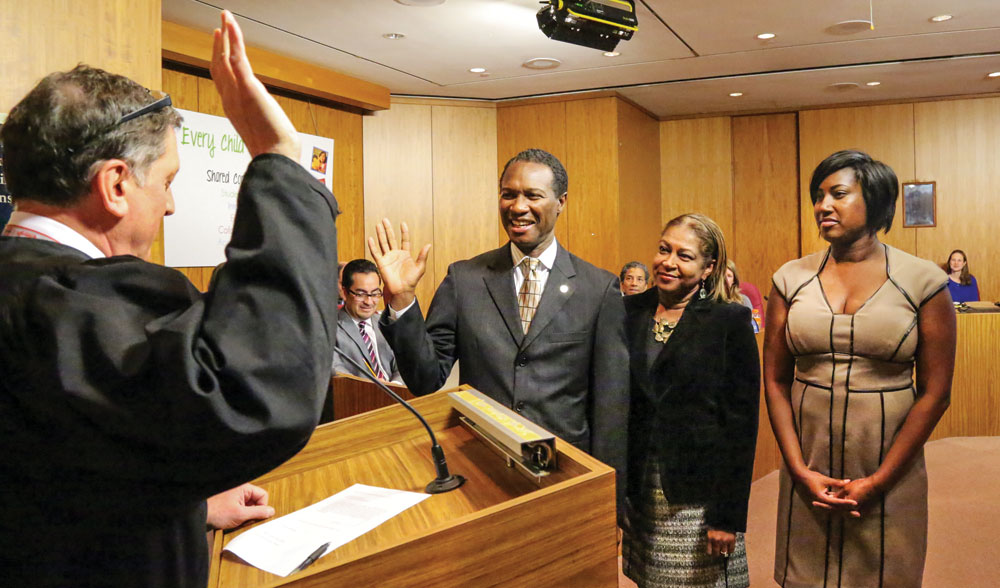Unequal Schools Led Taylor to Serve

DPS School Board Director Landri Taylor is shown being sworn into office in March 2013 to fill a vacancy. He is accompanied by his wife, Gloria, and daughter Kristol.
Landri Taylor, former Denver School Board Director, says the experience having his own children in segregated sub-par Denver schools in the ’80s and ’90s drove his decision to accept a position on the school board. He was asked to fill a vacancy for the volunteer position in March 2013 and then was elected to a four-year term starting in November 2013. His district covers an area from Five Points to DIA.
Taylor, a Stapleton resident since 2003, submitted his resignation in February shortly after his wife, Gloria, contracted a sudden and severe illness. In 2013, when he was asked to serve on the board, Taylor and his wife were already thinking about downsizing and spending more time with their children and grandchildren. He says he accepted the position to be an advocate for change, especially in communities of color where he wants parents and kids to have equity in choice of schools. And, he believes, the image of a person of color on the board is important to kids as they look at who is representing them.
In the ’80s and ’90s, when the Taylors chose to live and raise their children in Montbello, they knew they had a sub-par neighborhood school. “Gloria and I felt it was safer that our kids were in a community school with kids that looked like them. If they went to a predominantly white school they would experience racism. We didn’t want them to have that social-emotional battle. We felt, ‘We’ll keep them in this safe environment and we’ll supplement their educational needs at home.’”
But, Taylor says, despite their efforts to supplement their kids’ education, his children discovered when they got to college they were behind their peers who went to better quality schools. His kids could be protected from racism or they could get a good education but they couldn’t have both. That personal experience, Taylor feels, enabled him to add an important perspective to the DPS Board.
Today he thinks black parents have fewer of those kinds of concerns because Denver is very progressive compared to the ’80s when the racism was overt. “You can’t eliminate the subtle racism but kids will develop enough social-emotional strength and guidance from their parents to understand that that still exists and how to better handle it. That wasn’t the case when I was a kid or Gloria was a kid. And it wasn’t the case 30 years ago.”
Over the years Taylor has had a soft spot for other causes he believes in.
His first cause was at age 18 as a freshman at the University of California at Berkeley. He participated in a protest for three months, holding signs and blocking entry to the campus and classrooms to draw attention to the need for an Ethnic Studies Department. He flunked his classes that quarter and had to go to the dean and “beg to be reinstated.” He was not only reinstated; the chancellor asked him to serve on a committee to establish a new Ethnic Studies Department—and he was on the selection committee that brought Alex Haley to be a professor in the new department.
He moved to Colorado in 1980 and married Gloria. “In 1988 I got inspired looking at Rev. Jesse Jackson giving a speech at the Democratic National Convention—talking about couch potatoes—and I was sitting on the couch.” He got involved with the Denver Democratic Party and ran it for a couple of years.
In 1997 Taylor found another cause. “The Skinheads threatened to prevent the MLK Marade in 1997. They were going to camp out and get the permit for use of the Capitol steps so we wouldn’t be able to celebrate.”
The rule was that people couldn’t start lining up for permits for 1997 events until two days before the start of business in 1997. Taylor says he got someone to park a motor home in front of the office and he and about 20 other people arrived at midnight on Saturday night at the beginning of January. They kept someone on the step for two days and successfully got the permit.
Taylor worked for Forest City from 1999 until 2009 as VP of community affairs, bringing early affordable housing developers and minority contractors and workers to Stapleton.
When Taylor joined the board in 2013, he was head of the Denver Urban League. The formerly active organization had closed down in 2008. Their building had been sold and they had an outstanding debt of $456,000. Taylor says from 2009 to 2013 he raised over $2 million, retired the debt and established job training and after-school educational programs.
Although much remains to be done in DPS, Taylor says he’s encouraged by the progress over the last three years, particularly in decentralizing DPS. There’s now a greater recognition that schools need to determine what will best support the needs of their students—and arrange for those services— whether it’s health clinics, food or extra social and emotional support.
To apply for the vacant seat:
Applications must be submitted by Friday, March 4, 2016.Visit http://board.dpsk12.org for information.




0 Comments